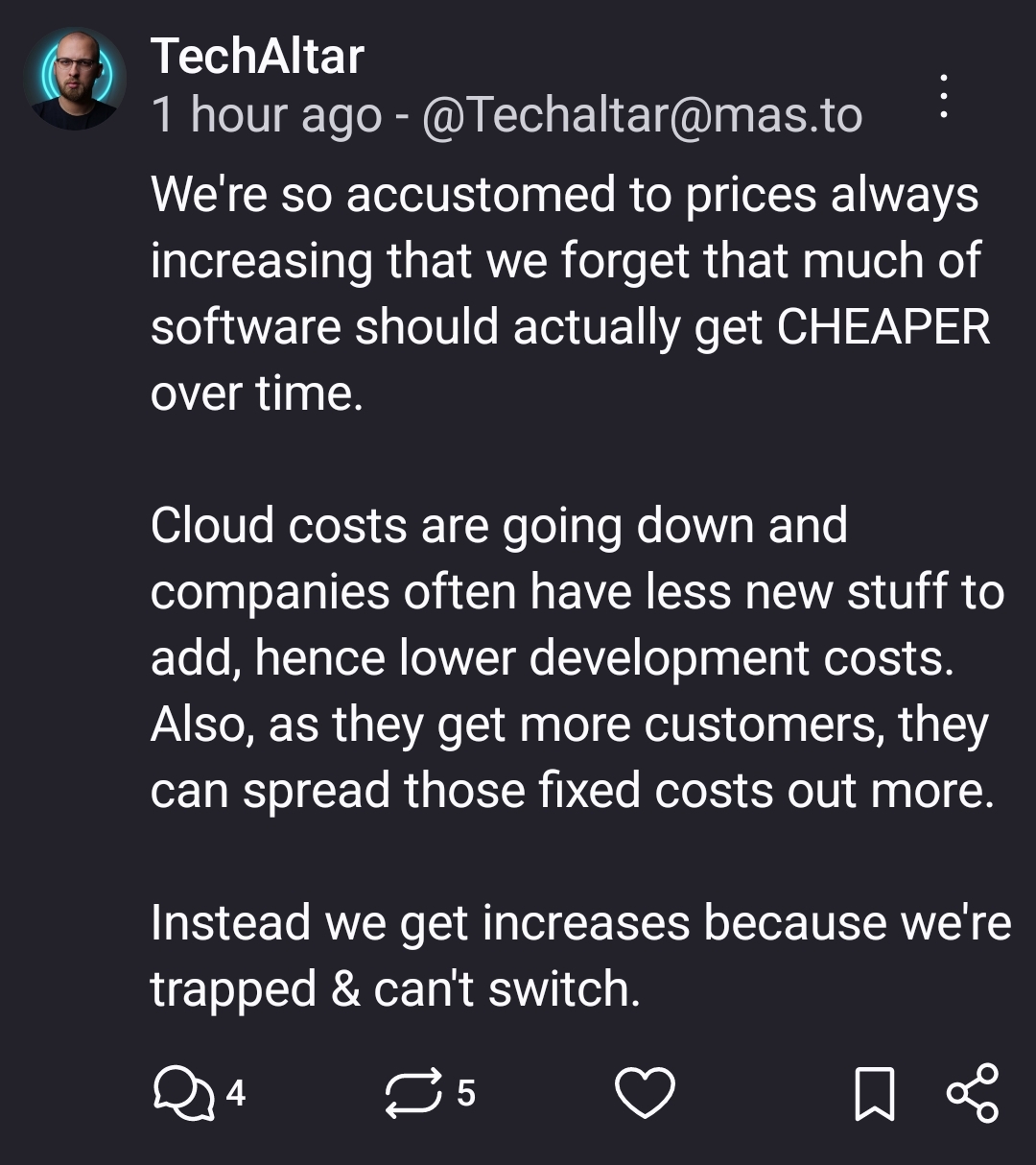this post was submitted on 23 Oct 2024
1011 points (98.7% liked)
People Twitter
5125 readers
2143 users here now
People tweeting stuff. We allow tweets from anyone.
RULES:
- Mark NSFW content.
- No doxxing people.
- Must be a tweet or similar
- No bullying or international politcs
- Be excellent to each other.
founded 1 year ago
MODERATORS
you are viewing a single comment's thread
view the rest of the comments
view the rest of the comments

There was another thread recently about what happened in your life that made you no longer feel like a child. I think for me one of those things was realizing that the price of things has very little to do at all with the cost of creating that thing.
Price = Cost of Materials + (Middle Man + Middle Man + Middle Man + Middle Man + Middle Man + Middle Man) + Cost of Labor.
It's Econ 101
And that cost of labor
I buy a fair bit of meat. At my nearest butcher scotch fillet steak (rib eye, I think, in American English) is $35 per kilo. It is from a meat packing plant with reasonably cheap labor, with expensive equipment amortized over thousands of cattle a year, cutting up cows all day
At my next nearest butcher it's $60/kg. It's cut off a cow carcass hanging in the back of the shop by a butcher with a knife
On the good side there are few middle men in meat
Come down to Texas and you can get a ribeye for closer to $12/kg.
Mine are grass finished, and watered with rain - the most environmentally friendly meat available. I expect the cheap meat in Texas is grain finished, which makes each animal fatter and heavier and cheaper per unit weight
Nah, the cost of labor + materials + distribution is the minimum price of an item. The actual price in practice will be that price + whatever the manufacturer can get away with charging.
What determines the premium they can get away with is whether or not alternative goods exist and whether or not the consumers are informed of them, motivated to seek them out, and capable of making the switch.
In this case, the manufacturer is a middle man
Macroecnomics is just all the different ways we ruin microeconomics
Marco is microecon when you hit the boundaries of the closed system.
The problem with modern Western application of Macro is that it just tries to scale up Micro to the size of countries and continents. No consideration for limited lifetime resources, negative externalities, or long term growth rates under deteriorating conditions.
True proper macro economics asks questions about peak oil and pension funding and the real cost of global military conflicts, rather than obsessing itself with next quarter growth figures at the GDP scale.
Non-economist: the economy must be shit because I can barely afford bread.
Economist: UR WRONG, GDP GO UP
That's more or less the state of discourse right now and it's embarrassing.
There's a guy I love, named Richard D. Wolff, who loves to joke about how colleges insist on having an Economics School and a Business School, when these should theoretically be the same field of study. Then he'll bring up a few anecdotes over professors from the respective schools arguing over this or that point of orthodoxy.
My favorite is "The Economic Calculation Problem", a thing that Chicago School Economists swear by, but which executives at vertically integrated firms like Exxon, Walmart, and Amazon defy on a daily basis. There's a great book called "The People's Republic of Walmart" that suggests a lot of the underlying computational problems of economics have been resolved within these mega-corps, using the same theories and policies once practiced by Soviet-Era states.
That's the real divide between Macro In-Theory and In-Practice. One is functionally just state propaganda, while the other is the hard math of balancing a global supply of finite resources and labor while generating consistently larger surpluses.
Sounds interesting. Chicago school being wrong yet again would hardly be surprising but it still sounds like an interesting read.
Price is whichever is greater: what they think the highest cost*adoption will be or the minimum people will do it for.
This is actually the reason why taxes don't increase luxury item costs as the cost is set to the market demand rather than from supply. In fact, the benefits from taxes help people afford more products in a virtuous cycle. It's also the reason tariffs or taxes on raw goods are so bad as you actually are creating dead weight loss and driving down demand which can be useful or detrimental depending on why someone needs that product.